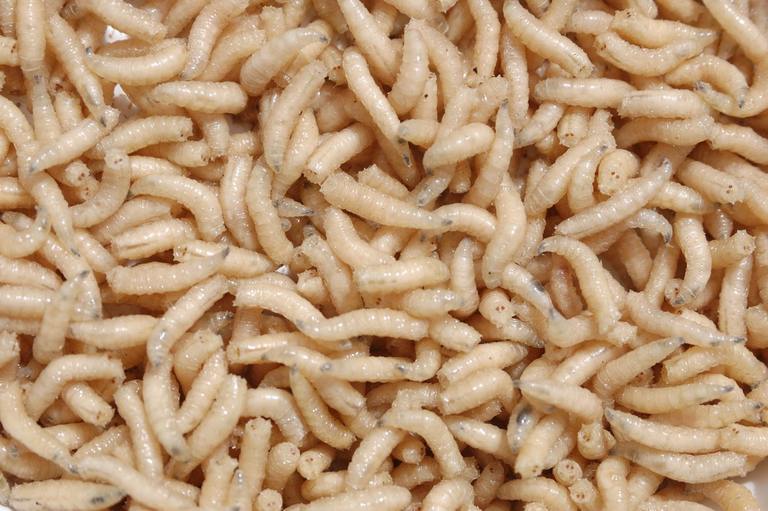Maggots: What Are They and Why Are They in Your Home?
Published: September 17, 2024

Introduction
Maggots: What Are They and Why Are They in Your Home? This is a common question many homeowners find themselves asking when they spot these unwelcome larvae wriggling in their trash bins or near decaying food. Maggots thrive in environments where they can easily access food sources, such as garbage bins, compost piles, or even pet waste. To prevent an infestation, ensure that all food is stored in sealed containers and dispose of waste promptly. Regularly clean trash cans and keep your home free from decaying organic matter. If you do encounter maggots, act quickly to remove them and sanitize the affected area to prevent further issues.
What Are Maggots?
Maggots: What Are They and Why Are They in Your Home? In simple terms, maggots are the larvae of various species of flies, most commonly the housefly (Musca domestica) or blowfly (Calliphoridae). These small, white, worm-like creatures thrive in environments rich in decaying organic matter. Their primary role in nature is to decompose dead tissue and recycle nutrients back into the ecosystem.

Life Cycle of a Fly
To fully grasp the answer to "Maggots: What Are They and Why Are They in Your Home?", it’s essential to understand the life cycle of a fly:
- Egg Stage: Female flies lay eggs on decomposing organic matter.
- Larval Stage: Eggs hatch into larvae, known as maggots.
- Pupal Stage: Maggots transform into pupae.
- Adult Stage: Pupae emerge as adult flies.
Each stage plays a critical role in the development of flies and their ability to infest homes.
Why Are Maggots In Your Home?
Poor Sanitation
Maggots: What Are They and Why Are They in Your Home? Often, the root cause is poor sanitation. Flies are notorious for being attracted to filth and decay. Uncovered trash bins are particularly inviting, as they often contain decomposing organic matter that emits strong odors, signaling to flies that a potential breeding ground is nearby. Pet waste and uncleaned food spills also contribute to these conditions.

Maggots feasting on leftovers or appearing near trash bin lids are tell-tale signs. Overlooked areas such as drains and compost bins can harbor decaying organic material out of sight but still accessible to flies. Addressing sanitation proactively can dramatically reduce the chances of encountering maggots in your home.
Improper Food Storage
Maggots: What Are They and Why Are They in Your Home? Improper food storage is another leading cause. Flies lay their eggs on exposed food, especially meat, fruits, and even pet food. When those eggs hatch, maggots emerge and begin feeding.
Prevention Tips For Maggots:
- Use Airtight Containers: Prevent flies from accessing food.
- Refrigerate Promptly: Keep perishable food out of the danger zone.
- Clean Regularly: Eliminate crumbs and spills that attract pests.
- Secure Trash Bins: Prevent flies from breeding inside them.
- Check Expiry Dates: Regularly clean out your pantry.
Dead Animals
Sometimes, maggots appear due to the unnoticed presence of dead animals in attics or wall voids. Flies lay eggs on these carcasses, leading to maggot infestations. Prompt removal of dead animals and professional inspections help reduce this risk.
Moisture Issues
Excess moisture is another condition that answers the question, "Maggots: What Are They and Why Are They in Your Home?" Leaky pipes, condensation, or stagnant water can create the perfect habitat for flies to lay eggs. Flies prefer damp environments where larvae can survive and thrive. Fixing moisture issues is a key step toward long-term prevention.

How To Address a Maggot Infestation
Clean Thoroughly
- Remove decaying matter.
- Sanitize bins with disinfectants.
- Dispose of pet waste promptly.
- Wipe food-prep surfaces.
Use Boiling Water
Boiling water can instantly kill visible maggots, though it should be used cautiously to avoid injury.
Apply Natural Remedies
Salt, vinegar, or lime can dehydrate maggots. Natural repellents sprayed around entry points help deter adult flies.
Employ Chemical Treatments
Insecticides for larvae control can be effective in large infestations. Always follow label instructions.

The Importance of Consulting a Pest Control Professional
Maggots: What Are They and Why Are They in Your Home? If you're still wondering, a pest control professional can give you a definitive answer and long-term solution.
Expertise and Knowledge
Professionals understand pest biology and behavior, helping them pinpoint the root causes and best treatment methods.
Comprehensive Inspection
Trained technicians look beyond the surface, locating hidden breeding grounds that DIY efforts might miss.
Customized Treatment Plans
A tailored plan considers the layout of your home, environmental factors, and health safety, ensuring the best possible outcome.
Preventive Measures
Ongoing pest control services and expert advice will help you keep maggots and other pests at bay permanently.

Conclusion
Maggots: What Are They and Why Are They in Your Home? The answer often lies in poor sanitation, improper food storage, dead animals, or moisture issues.
DIY methods—thorough cleaning, natural remedies, and chemical treatments—can help manage an infestation. However, professional pest control services offer a comprehensive approach to prevention and eradication. By understanding the full lifecycle of maggots and addressing the environmental factors that attract them, homeowners can protect their spaces more effectively.